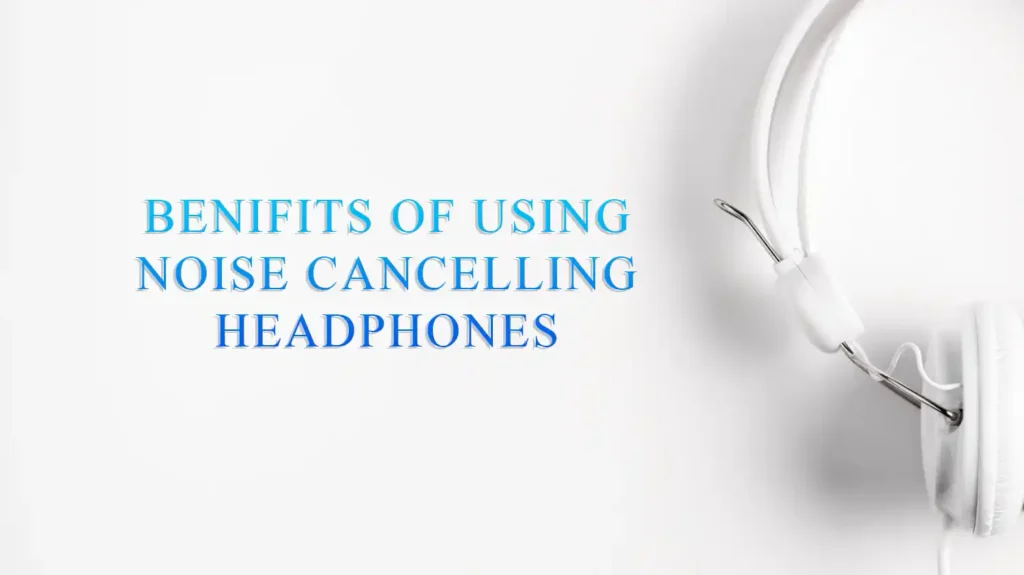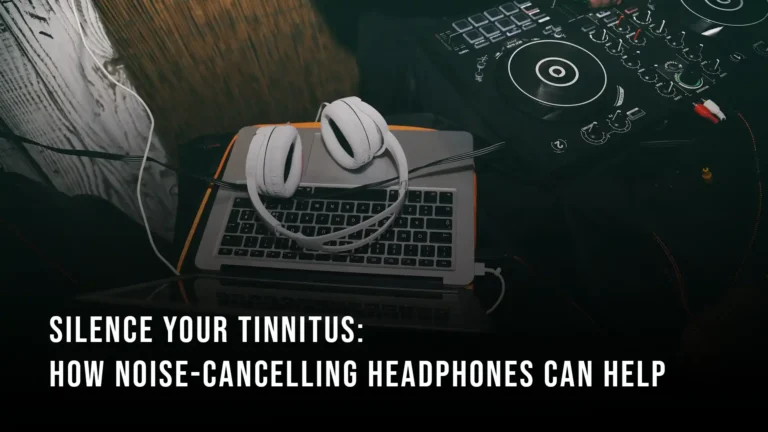Living with tinnitus can be challenging. Noise-cancelling headphones have gained popularity in recent years as a tool to block out unwanted noise and provide a more immersive listening experience. However, they also have therapeutic benefits for those with tinnitus. In this blog, we will explore how noise-cancelling headphones can help tinnitus and improve overall hearing health.
Whether you are new to tinnitus or have been living with it for years, this blog will provide you with valuable insights into the role that noise-cancelling headphones can play in reducing the impact of tinnitus on your daily life. So, let’s get started!
How noise-cancelling headphones can help tinnitus?

There are different types of noise-canceling headphones, such as passive, active, and adaptive. Passive noise-canceling headphones block out external sounds by creating a physical barrier around your ears, such as ear cups or ear plugs. Active noise-canceling headphones use a microphone to pick up the ambient noise and generate an opposite sound wave that cancels it out. Adaptive noise-canceling headphones adjust the level of noise cancellation according to the changing environment.
Noise-canceling headphones can help tinnitus in two ways. First, they can reduce the exposure to loud noises that can damage your hearing and worsen your tinnitus. By wearing noise-canceling headphones, you can listen to music or other audio at a lower volume, which is safer for your ears. Second, they can mask the tinnitus sound by providing a more pleasant and relaxing sound, such as white noise, nature sounds, or music. This can help you cope with the tinnitus and reduce its impact on your mood and concentration.
Tinnitus

Tinnitus is the unwelcome guest that never seems to leave the party. You know the one, the guest that keeps talking when everyone else is ready to go home. But just how common is this unwanted companion?
Tinnitus is a condition where you hear sounds that aren’t actually there. It can be ringing, buzzing, hissing, or any other sound that seems to come from inside your head. It’s like having a mischievous little gremlin that’s decided to make your ears its playground.
Prevalence of Tinnitus
Tinnitus is a common condition that affects people of all ages, but it is more common in older adults. It is estimated that up to 1 in 5 people have tinnitus at some point in their life, and 2-3% of the population experience chronic tinnitus.
The prevalence of tinnitus varies around the world, but it is generally similar in different countries. A 2019 study estimated that the global prevalence of tinnitus is 14%, with 2% of people experiencing severe tinnitus.
Tinnitus is more common in men than in women, and the prevalence increases with age. For example, a study of adults in the United States found that the prevalence of tinnitus was 10% in young adults, 14% in middle-aged adults, and 24% in older adults.
How many Types of Tinnitus are there?

There are two main types of tinnitus: subjective and objective.
Subjective Tinnitus
Subjective tinnitus is the most common, and it’s the kind of tinnitus that only you can hear. It’s like having a secret admirer whispering sweet nothings in your ear, except the sweet nothings are annoying sounds.
Objective Tinnitus
Objective tinnitus, on the other hand, is rare and can be heard by a doctor during an examination. It’s like having an obnoxious party guest who refuses to keep quiet, no matter how many times you ask them to.
What are the Causes of Tinnitus?

Some common causes of tinnitus include exposure to loud noise, age-related hearing loss, ear infections, head or neck injuries, and certain medications. It’s like playing a game of Clue, trying to figure out which culprit is responsible for the unwanted sound in your ears.
What are the Risk Factors for Tinnitus?
Some common risk factors for tinnitus include exposure to loud noise, smoking, high blood pressure, and certain medical conditions. It’s like playing a game of roulette, hoping that you don’t hit the unlucky number that triggers your tinnitus.
Coping Mechanisms for Tinnitus
Tinnitus is like an unwelcome guest, but there are ways to make it feel less at home. Coping mechanisms for tinnitus include sound therapy, cognitive-behavioral therapy, relaxation techniques, and, of course, noise-canceling headphones. It’s like having a toolbox of solutions to deal with that pesky house guest who just won’t leave. With the right approach, you can show that tinnitus is the boss and live your life to the fullest.
What are the Benefits of Using Noise-Cancelling Headphones for Tinnitus?

Reduction in Environmental Noise and Stress
One of the benefits of using ANC headphones is a reduction in environmental noise. It works by using microphones to pick up low-frequency noise and neutralize it before it reaches the ear. Potentially reducing harmful noise levels by up to 30 dB.
ANC solutions improve the experience of listening to audio by reducing environmental noise and stress
Improved Focus and Concentration
Active Noise Cancellation (ANC) can help improve focus and concentration by creating an opposing sound wave to cancel out ambient noise, allowing the user to better concentrate on their work. ANC also helps to immerse the user in their music, reducing stress and helping them relax.
How to choose the right pair of noise-canceling headphones for tinnitus relief?

- Precautions and Limitations: When using noise-cancelling headphones, there are certain precautions and limitations that should be considered to ensure safety and maximum benefit. It is important to note that not everyone is a suitable candidate for using noise-cancelling headphones, and there are some potential risks and side effects associated with their use.
- When Not to Use Noise-Cancelling Headphones: Active Noise Cancellation (ANC) technology can be limited by the accuracy of the microphones used to capture ambient sounds. It is not advisable to wear ANC headphones while on the road for safety reasons, as it blocks out important noises such as car horns.
- Potential Risks and Side Effects of Noise-Cancelling Headphones: The main disadvantages of Active Noise Cancellation (ANC) headphones include being expensive, making users unaware of their surroundings, potentially spreading ear infections, having a short battery life, and causing jaw pain, headaches, dizziness, and ear pressure.
Here is the list of best headphones for Tinnitus
Use of Noise-Cancelling Headphones with Other Treatments

Noise-cancelling headphones can be used in conjunction with other treatments for tinnitus relief, such as cognitive behavioral therapy or sound therapy. However, it is important to consult with a healthcare professional before using multiple treatments at once, as they may interact with one another and cause unintended side effects.
Alternatives to Noise-Cancelling Headphones for Tinnitus Relief
While noise-cancelling headphones can be effective at reducing environmental noise, there are also alternative methods for tinnitus relief. Some people find that relaxation techniques, such as deep breathing or yoga, can help reduce stress and lessen the severity of tinnitus symptoms.
Additionally, using white noise machines or sleeping with a fan can provide a similar effect to noise-cancelling headphones.
Conclusion for How ANC Headphones Help Tinnitus

Tinnitus is a condition in which an individual hears sounds that do not exist. The prevalence of tinnitus is up to 15% of the adult population, and the causes and risk factors are many, including exposure to loud noise, ear infections, head or neck injuries, certain medications, and high blood pressure.
Noise-cancelling headphones work by actively reducing external noise, which can help reduce the outside world’s impact on someone’s already-sensitized ears, making it easier to concentrate, sleep, or relax, especially for those with tinnitus. However, some limitations and precautions must be considered when using these headphones.
Active Noise Cancellation (ANC) technology is limited by the accuracy of the microphones used to capture ambient sounds, and it is not advisable to wear them while on the road for safety reasons, as they can block out important noises such as car horns.
Frequently Asked Questions
The main difference between noise-canceling and regular headphones is that noise-cancelling headphones use electronic processing to analyze ambient sound and attempt to generate the “opposite” sound, resulting in less overall noise. while regular headphones are passive and do not actively reduce noise. Noise-cancelling headphones also tend to sound better than regular headphones due to their noise-cancelling feature.
Noise-cancelling headphones can be effective for some types of tinnitus, particularly those that are caused or worsened by exposure to loud or constant noise. However, they may not be as effective for other types of tinnitus, such as those that are related to issues with the inner ear or other medical conditions.
Noise-cancelling headphones are considered safe for regular use as they don’t emit low-level radiation like cell phones do. However, some users have reported experiencing headaches, dizziness, or nausea while using them.
Also, noise-cancelling headphones are most effective with continuous noise and may not be as useful for sudden or brief sounds.
Noise-cancelling headphones can offer short-term relief from tinnitus and can help prevent further damage to hearing caused by exposure to loud noise, which can exacerbate tinnitus. Nonetheless, there is no scientific proof that using phase cancellation technology can decrease or eliminate tinnitus.
Yes, noise-cancelling headphones are generally safe for children to use. However, it’s important to use them responsibly and follow the manufacturer’s guidelines for safe use. Additionally, parents should supervise their children while using noise-cancelling headphones to ensure they are not using them for extended periods of time or at dangerously high volume levels.




